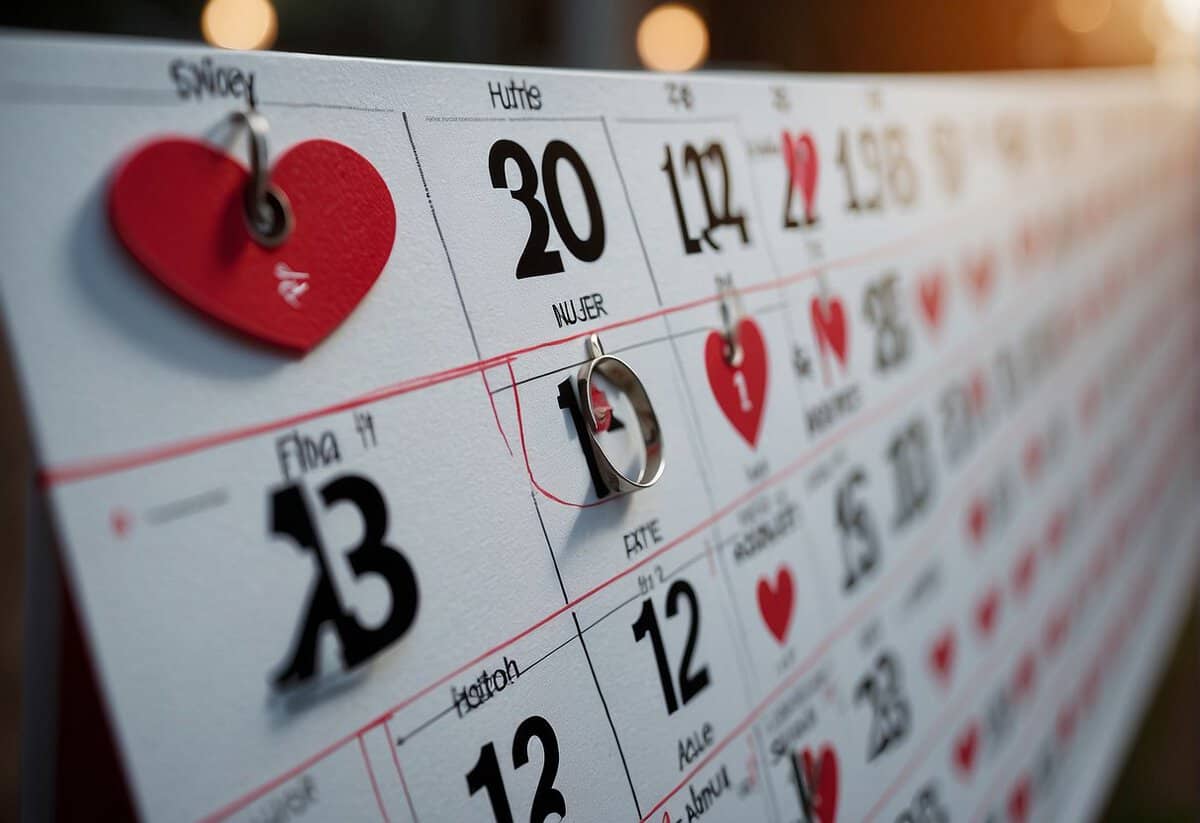How Long Do You Date Before Getting Married? Unpacking the Timeline
When thinking about tying the knot, one of the most common questions you may have is how long to date before getting married. The time people spend dating before an engagement can vary considerably, often due to varying cultural norms, personal readiness, and life situations. While there’s no one-size-fits-all timeline, studies have suggested that dating for a certain period can reduce the likelihood of divorce. For example, relationships that have matured over three years tend to fare better in terms of stability.

Deciding on the ideal length of time to date before marriage requires an intricate balance of personal factors, relationship dynamics, and practical considerations. You will need to reflect on how well you know your partner, how you manage conflicts, and your shared values and goals. Typically, couples who spend more time getting to know each other before marriage build a stronger foundation for marital success. According to recent studies, most people date for an average of two or more years before getting engaged, aiming to understand life compatibilities and mutual experiences.
Key Takeaways
- The appropriate dating period before marriage varies, with a longer duration often linked to lower divorce rates.
- Personal readiness and relationship dynamics are key components to consider before deciding on marriage.
- Most couples today date for over two years before considering engagement, highlighting the importance of shared life experiences.
Cultural and Social Factors

When you’re considering the journey from dating to marriage, your experience is deeply influenced by cultural and social factors. These can dictate the expected timeframe for making the commitment and how much influence your family and society have on your decision.
Social Norms and Expectations
In many Western cultures, including the UK, it’s socially acceptable to date for several years before getting married. This period is seen as vital to building a strong foundation for a successful marriage. You’re encouraged to use this time to understand your compatibility with your partner and navigate life’s many challenges together.
Influence of Family and Peers
Your parents and family can significantly impact your decision on when to get married. In some cultures, family approval is crucial and you might face pressure to conform to family expectations regarding the timing of your wedding. Likewise, your peers can also influence your decision; seeing friends marry can sometimes bring added pressure to advance your relationship more quickly.
Arranged Marriages and Cultural Diversity
Arranged marriages highlight a different spectrum of cultural norms when it comes to dating and marriage. In cultures where arranged marriages are prevalent, the dating phase as it’s known in Western societies may not exist, and the time from meeting to marriage can be very short. However, even within arranged marriage frameworks, there is a growing trend towards allowing potential couples time to get to know each other to ensure compatibility.
Personal Factors and Readiness

Before diving into a lifelong commitment like marriage, carefully consider several personal factors and your readiness. These components influence the timing and quality of your future relationship significantly.
Age and Maturity Considerations
Your age can play a crucial role as it often correlates with maturity levels. While you might be legally an adult at 18, your twenties can be a transformative time for personal growth. For example, studies indicate that waiting until your late twenties or thirties can decrease the likelihood of divorce. Maturity, rather than chronological age, ensures you’re both able to handle the challenges marriage brings.
Personal Goals and Career Plans
Your career plans and personal goals should also be taken into account. If you have aspirations that require significant commitment, like pursuing advanced education or a demanding career, these should align comfortably with your partner’s plans. Couples who sync their goals and work on shaping their lifestyles and needs together often find a stronger foundation for marriage.
Emotional Stability and Compatibility
Lastly, the quality of your emotional intimacy and compatibility with your partner is pivotal. These aspects determine your readiness to commit and sustain a marriage. Do you feel emotionally secure and understood? Is there a sense of mutual respect and support for one another’s individual wants and needs? Answering ‘yes’ to these could mean you’re on the solid ground needed for a healthy, long-term union.
Relationship Dynamics

Understanding the dynamics of your relationship is crucial as it incorporates communication, shared values, and the assessment of long-term commitment—all of which play a significant role in determining relationship satisfaction and readiness for marriage.
Communication and Conflict Resolution
Effective communication in a relationship is key to understanding and managing your partner’s and your own needs. It’s important to address conflict with the intention to resolve it, rather than to win an argument. Partners who have developed a healthy way of communicating often find themselves more satisfied in their relationship. Studies suggest that the ability to resolve conflicts can decrease the likelihood of divorce.
Importance of Shared Values and Interests
Sharing core values and interests with your partner creates a strong foundation for your relationship. It’s the common ground that can keep you bonded when you face life’s challenges together. When you and your partner hold similar values, you’re more likely to have long-term relationship satisfaction and a successful marriage.
Assessing Long-Term Potential and Commitment
Assessing your relationship in terms of long-term potential and commitment to one another is a step you cannot skip before deciding to marry. Your mutual commitment to the relationship often indicates the level of love and involvement you both feel. A study showed that couples who took more time to date before getting married reported higher levels of satisfaction and had a deeper understanding of their long-term commitment.
Practical Considerations

Before you decide on the right time to tie the knot, consider practical aspects such as your financial readiness, living together before marriage, and aligning the decision with life’s significant milestones.
Financial Planning and Stability
Money plays a crucial role in your marriage decision. It’s important to discuss and agree on financial goals and habits with your partner. According to a survey by the Pew Research Center, financial stability is considered essential before entering marriage. Create a budget to evaluate your combined income and expenses, account for potential savings, and plan for any outstanding debts. Getting married can be expensive when you factor in the cost of the ceremony, reception, and honeymoon.
Before walking down the aisle, ask yourself if you have a financial cushion for unexpected expenses — an emergency fund is a testament to financial stability.
Cohabitation and Pre-Marriage Living
Living together before marriage — cohabitation — has become an important milestone for many couples. It can help you understand the dynamics of everyday life with your partner and reveal habits that only cohabitation exposes. While some researchers suggest that cohabitation can lead to a higher divorce rate, more recent studies have found that this is less of a concern when you’re over the age of 23. Deciding to live together is also an opportunity to discuss how household responsibilities will be shared, which is paramount for a harmonious home life.
Timing and Life Milestones
When considering the right time to get married, take into account life experiences and milestones. Have you and your partner had time to experience significant events together that test your compatibility and resilience? Whether it’s traveling, managing stress, or dealing with family dynamics, these experiences can strengthen your bond. The dating time before marriage should reflect an opportunity to go through a variety of situations — from the blissful honeymoon phase to more challenging times.
It’s also wise to consider other milestones such as career goals, education, or the desire to have kids. Many men and women nowadays wait until they’ve achieved a measure of career success before getting married. Therapists often recommend understanding your partner’s aspirations and determining how they align with yours, as it can significantly impact marital satisfaction.
Remember, marriage is a partnership, and ensuring that you’re both aligned on important practical aspects can help you build a strong foundation for a successful future together.
Frequently Asked Questions

In navigating the path to marriage, you might wonder how long couples typically date before deciding it’s time to say “I do.” This varies greatly depending on age, life stage, and personal circumstances.
What’s the typical duration of dating before making the commitment to get married in your 20s?
In your 20s, you’re likely experiencing many firsts and significant life changes. Dating for three or more years has shown to decrease the likelihood of divorce, giving you time to grow together.
Is there an average length of time couples date before tying the knot in their 30s?
Entering your 30s, you may have a more stable life and clearer goals. Since there’s no set rule, dating for at least 1 to 2 years before marriage can be beneficial to understand each other through different life events.
Does the dating timeline before marriage extend as you enter your 40s?
When you’re in your 40s, relationships may involve merging established lives. The dating period may vary greatly, often depending on past experiences such as prior marriages or children, leading to either shorter or more extended dating timelines before marriage.
In your 50s, how long do people usually wait before deciding to marry?
In your 50s, you may prioritize companionship and shared values over other factors. Thus, the dating duration before marriage can be shorter, as you’re more likely to be certain of what you’re looking for in a partner.
Are there any statistics that suggest an ideal dating duration before marriage?
Statistics indicate that dating for an average of 25 months before marriage led to greater marital happiness. However, every relationship is unique, and what works for one couple may not be the best for another.
How quickly do individuals know if they want to spend the rest of their lives with someone?
Some individuals report knowing “right away” if they want to marry someone, but a more measured approach includes dating for some time to ensure compatibility. The average of 18 months of dating before an engagement can be a reasonable period to gauge long-term potential.


